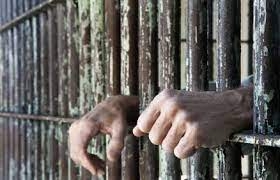ENCOURAGED, PERHAPS, by the chorus of approval that greeted the arrest of Augusto Pinochet in London last October, a French lawyer has begun legal proceedings against a different Latin American dictator, one whose crimes began long before Pinochet seized power in Chile and continue to this day.
Serge Lewisch represents two surviving victims of Fidel Castro's machinery of repression and the widow of a third who didn't survive. His lawsuit, filed in a Paris court last Wednesday, accuses Castro of crimes against humanity, murder, torture, illegal detention, and drug smuggling. That Castro is guilty of these things is a plain fact, undisputed by honest men and women.
 In Cuba, where dissent is forbidden, hundreds of political prisoners are behind bars for holding opinions of which Castro disapproves. |
Not that el comandante will be brought to trial as a result of Lewisch's efforts. Unlike Pinochet, Castro is an incumbent tyrant, not a retired one. And he will have learned from what befell Pinochet not to travel to countries where the rule of law is taken seriously.
All the same, it will be instructive to discover whether the attempt to bring Castro before the bar of justice is supported by those who cheered Baltasar Garzon, the Spanish magistrate who requested Pinochet's extradition from Britain. Those like Kofi Annan, for example. The UN secretary general hailed the arrest of Pinochet as sign that "international human-rights law is coming into its own." Will he now say the same thing about the suit against Castro?
Amnesty International, despite its name, favors putting Pinochet in the dock and so testified before the British Law Lords. "It is vital now," says David Bull, Amnesty's director, "that justice is done." Does Amnesty consider it vital that justice be done in Castro's case, too?
Intellectuals have been especially insistent that Pinochet answer for his felonies. Salman Rushdie, a novelist who knows something about the tactics of repressive governments, celebrated Pinochet's arrest for upholding "the crucial principle of universal accountability . . . . Atrocity is not to be excused by the occupancy of high office." The noted Chilean writer Ariel Dorfman, whose play "Death and the Maiden" deals with the yearning of dictators' victims to see their tormentors put on trial, saw the legal action against Pinochet as "a gift to Chile . . . a favor done to all Chilean citizens." Where do Rushdie and Dorfman stand on calling Castro to account?
We know where Bill Clinton stands. On Jan. 5, the administration announced a series of changes to America's anti-Castro embargo. The flow of dollars into Cuba will be increased; direct mail delivery will be established; the sale of US goods to "independent" Cuban farms and restaurants will be authorized; and cultural and athletic exchanges will take place — including a visit to Cuba by baseball's Baltimore Orioles.
All of which is likely to have the effect not of making life better for ordinary Cubans but of strengthening Castro's grip on power — and of eroding what little remains of the lonely US campaign to isolate and exhaust the last dictator in the Western Hemisphere.
This month marks the 40th anniversary of the putsch that launched Castro's despotism. These four decades have been the worst in Cuban history. Fidel-style communism, like all communism, has produced an abundance of poverty, misery, refugees, oppression, and death — and a shortage of everything else.
In Cuba, dissent is forbidden. It is a crime to engage in even peaceful opposition that "perturbs the socialist order." Hundreds of political prisoners are behind bars for holding opinions of which Castro disapproves. No one may leave the country without permission. The government arrests people without warrant and holds them without trial. There is no due process in Castro's courts, no right to call defense witnesses, no guarantee of legal counsel. Prisoners are beaten, malnourished, denied medical care, kept in solitary confinement, forced into slave labor.
Fidelismo at 40 is the ugliest thing in the Americas.
It is true that the junta in Havana is no longer as homicidal as it once was, but that is only because it no longer needs to be. The Cubans who most hated Castro's communism, who most yearned to live in a free democracy, are dead now. Or in exile. It is natural for tyrannies to become less murderous as time goes on, for there are fewer resisters left to murder. Brezhnev killed fewer people than Stalin. Jiang Zemin has less blood on his hands than Mao did. And Castro doesn't massacre innocents as frequently as he used to.
He massacres when he wants to, though. And not only Cubans.
In February 1996, three American citizens and one legal US resident were massacred when Cuban MiGs blew their two tiny airplanes out of the sky over international waters. Armando Alejandre, Mario de la Pena, Carlos Costa, and Pablo Morales were killed in cold blood as they patrolled the Florida Straits for the humanitarian group Brothers to the Rescue, searching for Cuban boat people in need of help.
Like all of Castro's victims, these were real human beings, men with families and friends and dreams for the future. In an earlier era, the naked murder of four US civilians by a strutting dictator would have ignited a terrible American fury. Today it ignites nothing. After 40 years, we have grown so accustomed to Castro's barbarities that we treat Cuba's enslavement as a normal fact of life.
Bring Castro to justice? We'll leave that to idealistic French lawyers. Americans can't be bothered.
(Jeff Jacoby is a columnist for The Boston Globe).
-- ## --
Follow Jeff Jacoby on X (aka Twitter).
Discuss his columns on Facebook.
Want to read more? Sign up for "Arguable," Jeff Jacoby's free weekly email newsletter.

